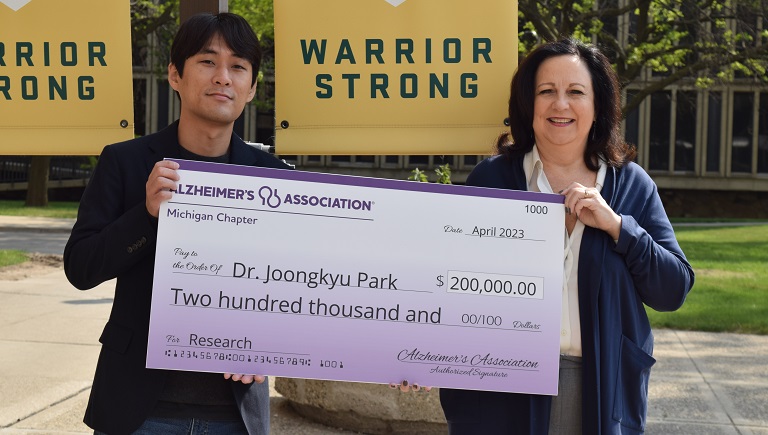
Wayne State University School of Medicine researcher Joongkyu Park, Ph.D., will use a three-year, $200,000 Alzheimer’s Association Research Grant to better understand how compartmental protein demand and homeostasis are modified in Alzheimer’s disease.

Dr. Park is an assistant professor of Pharmacology and of Neurology whose long-term goal is to understand synaptic molecular dynamics underlying memory formation and its impairment in Alzheimer’s disease and related dementias.
Representatives from the Michigan chapter of the Alzheimer’s Association visited Dr. Park’s lab in Scott Hall on May 18 to present the award.
“Alzheimer’s disease is a progressive, degenerative brain disease. The major symptoms are impairments in memory and cognitive functions,” Dr. Park said. “In the brain, neurons relay messages through synapses. Two distal parts of neurons called axon terminals – presynaptic – and dendritic spines – postsynaptic – form synapses. Both presynaptic and postsynaptic regions contain lots of proteins that play diverse roles. Therefore, it is critical to fulfilling the local demand for newly synthesized proteins under conditions of stress and diseases.”
Brains of Alzheimer’s disease patients and mouse models show loss of dendritic spines and alterations in synaptic functions, he added. These changes appear before the accumulation of amyloid deposits and tau inclusions in many models, suggesting that the synapse is one of the initial neuronal compartments impacted during Alzheimer’s disease pathogenesis.
Knowledge of the functional roles of local protein biogenesis in learning/memory and its alterations in tauopathy models will clarify the pathways of Alzheimer’s growth.
“Ultimately, these studies will accelerate progress toward treatments for Alzheimer’s disease by providing molecular insights into candidates that can be therapeutically targeted,” Dr. Park said.
Tauopathies are neurodegenerative disorders characterized by the deposition of abnormal tau protein in the brain. Tau is a protein that helps stabilize the internal skeleton of nerve cells (neurons) in the brain. In Alzheimer’s disease, an abnormal form of tau builds up and causes the internal skeleton to fall apart, according to the Alzheimer’s Association.
The function of local protein biogenesis at synapses in memory processes and its alterations in Alzheimer’s disease remain elusive, Dr. Park said.
The project focuses on local synaptic translation in the hippocampus of tau pathology mouse models.
“We will investigate changes in the local translation machinery and its activity in these models using biochemistry, immunohistochemistry and behavioral tests. In addition, we have established a virus-mediated molecular approach that can control the activity of local translation in animals,” he said.